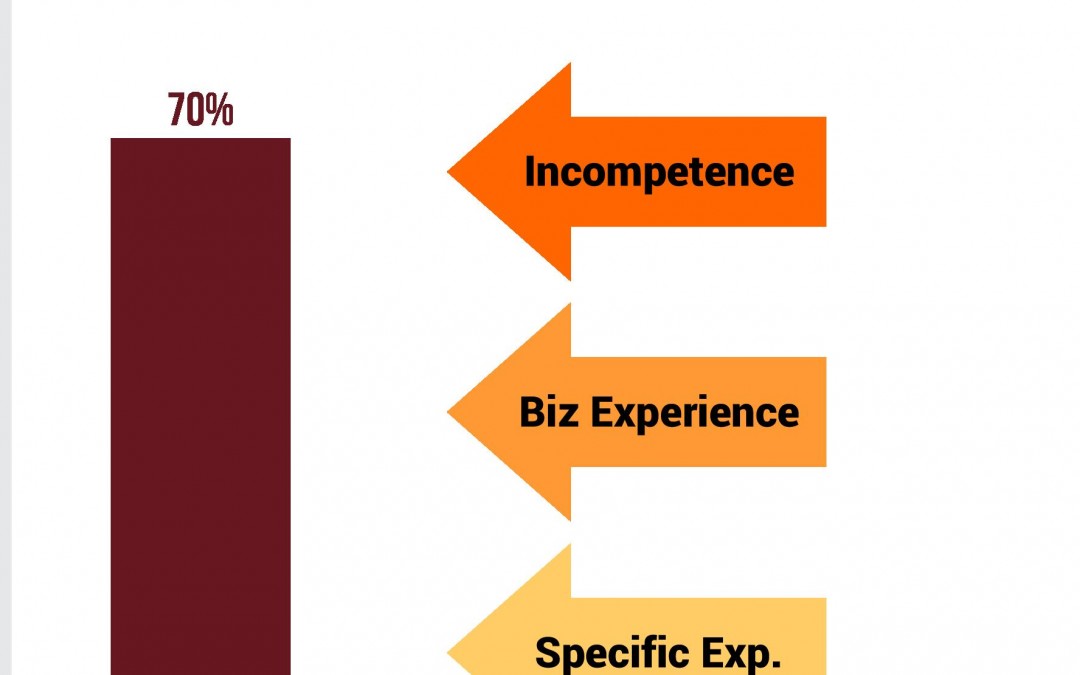70% of businesses fail. In some industries it happens faster than others.
These failed businesses were most likely founded by smart, hard-working people with great ideas, who had some money to get going. In my opinion, it shouldn’t be and doesn’t have to be this way. So, I’m working to help reverse the ratio, and based on my experience I’ll provide my personal insight into the findings from a recent study on Startup Business Failure* in this article.
Four of the top 10 “Leading Management Mistakes” identified in the study point to a lack of understanding of the market and target customers. In my experience, clearly knowing the people you are serving and the problem you are solving for them is essential to success (and not knowing is a leading cause of failure). That is why I view “Being in the wrong place at the wrong time”, “Lack of market awareness”, “The entrepreneur falls in love with the product/business”, and “Lack of clear focus” as symptoms of this single issue. You simply must know the problem you are solving and the specific group of people you are solving it for. Of course, that first step should be immediately followed by: are there enough of them so that serving a small, or better yet fractional, percentage provides the sales you need to profit?
Of course, we have all been guilty of this at one time or another – a great idea comes to you in the shower (or while you are somewhere else, but probably not engaged in “work”), and you just know “everyone will love it”. The trick is to have the discipline to go back and check exactly who is included in this “everyone” (believe me, it is never “everyone”!), and to make sure they actually care enough about the problem and your plan to solve it to spend money on it (before you spend money on making it a product or business).
The other “Leading Management Mistakes” include “Going into business for the wrong reasons”, “Advice from family and friends” (in my opinion, that would be OK if they are actually successful in what you need done, and want you to win), “Underestimated the time requirements/burn out”, “Family pressure on time and money commitments”, “Pride”, and “Lack of financial responsibility and awareness”. These issues are basically reflected in the “Pitfalls” that lead to failure.
The study groups the “Specific Pitfalls” into a few harshly named “Major Cause(s)” of failure: “Incompetence”; “Unbalanced or Lack of Managerial Experience”; “Lack of Experience in Line of Goods or Services”; and “Neglect, Fraud, Disaster”. I’ll tackle the first three because as I’m fond of saying (and make a point of reminding myself from time to time…), “You don’t know what you don’t know, and as smart as you are, figuring it out as you go along may be fatal to your business.”
The dominant Major Cause the study identified was “Incompetence”. 46% percent of failures were attributed to Incompetence by the study. This includes items related to planning, pricing, and basic finance. Like I said, you don’t know what you don’t know… However, there is no excuse for not finding out. There are plenty of free resources available from Score, SBA, and even the Your Biz Pro website. You can get a coach or mentor. You can interview people who have done it before. Bottom line is: you need to understand your costs, the pricing structure for your sales channel, the costs of marketing and overhead, and your cash flow timing (for example, it may be 6 months between the time you order product overseas and get paid for its sales in the US). Business income is not all spendable cash – the business needs to pay for operations, future inventory, taxes, and more. The key number is your net profit, and all of the things between your revenue and net profit need to be tracked and controlled.
The next Major Cause I’ll simply refer to as Business Experience. 30% of the failures were attributed to this, and the Pitfalls can be summarized as managing expansion and credit well. Like many of the Management Mistakes above, these Pitfalls are about being able to anticipate the need for time and money and plan for them. It isn’t difficult, but it can be fatal if you try to figure it out as you go along. The greater your experience, the better you are able to plan for what may lie ahead – and the more you will make sure you have some reserves for the unexpected. The challenge here is that there is a big gap between what you learn in school and the real world, and the people making things happen are busy and are not eager to help train a potential competitor. That’s where the resources mentioned above come in handy.
The last Major Cause I’ll address is a lack of Specific Experience in the business. 11% of the failures were attributed here, and this causes issues because you likely don’t know the reputable suppliers, or what reasonable costs are. You may not understand the seasonality of the business and fail to manage inventory well (or you may simply not understand the science and art of managing inventory). Or since you didn’t define your target market clearly, you are wasting advertising dollars – causing a drain on your resources compounded by weak sales results because the advertising isn’t doing its job. Many entrepreneurs make the mistake of thinking that since they held some position in an industry, they understand the industry. Even more common is a tech/inventor assuming that the business stuff is the easy part. Reality is they both have their place and complexity.
In my opinion, more businesses could and should succeed. The key is to put in the time and effort to fill your knowledge gaps before you begin putting money at risk. I’m committed to doing everything I can to help reverse the ration to a 70% success rate! Be sure to take the responsibility to learn the things you need to know to ensure your success.
* February 2015 study by Entrepreneur Weekly, SBDC, Bradley U., and U. of Tennessee Research


